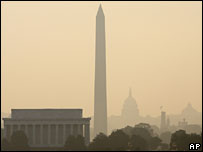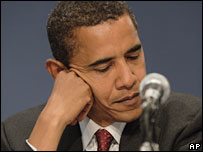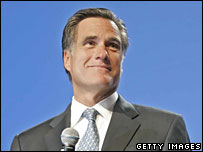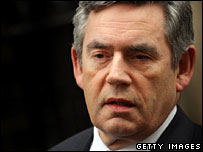Dua
JF-Expert Member
- Nov 14, 2006
- 3,229
- 662
Washington diary: Long haul to '08
Does Hillary Clinton going to be the first woman president of USA?
Soma hapaMatt Frei BBC News said:
The thermometer announced this afternoon that it was 94F (35C) - on 9 October. The air conditioning ploughs on in the Frei household. The basement is a freezer. The upstairs bedrooms still feel like a pizza oven and the mosquitoes, fat, complacent and cocky after a summer of feasting on our blood, are getting indigestion. Their happy hour continues. And so does our misery.

Sticky summer temperatures are persisting in Washington DC
The grass is yellow. The leaves are turning a turgid brown as opposed to a fluorescent red or yellow. I glance at the Washington Post that has landed on my doorstep, narrowly missing the geranium that still thinks it is August. Through the heat haze I make out headlines about fundraising quarter results posted by the candidates, upcoming debates, Fred Thompson's debut on the podium next to the other eight, or is it nine, Republican hopefuls? I no longer know for sure. My head is spinning. I feel faint. And it's only October 2007.
Yawns and wrinkles
We have another year and a month of this ordeal before we know who will inherit the White House from George W Bush. The most unpredictable and exciting election campaign in recent US history is beginning to feel like an extended, mosquito-infested Washington summer. And that's coming from a political junkie.
It's not just me. At recent campaign events I have noticed that the candidates, too, look and sound exhausted. The 45-year-old Barack Obama appears visibly aged by the relentless campaign, even as his critics claim that his biggest problem is youth. How unfair is that?

Campaigning is taking its toll on almost all the 2008 contenders
As Charlie Cook, the veteran political pollster and pundit put it: "Barack's obstacle is not that he's black but that he's green."
Even John Edwards has betrayed a few microscopic wrinkles around his doe eyes. Fred Thompson was filmed yawning like a hippo in Iowa. He looks completely knackered and he's only just started campaigning, and is keeping his stump speeches to a genteel minimum. The only candidates who look suspiciously unblemished by the experience of giving the same speech 10 times a day in three different time zones are Hillary Clinton who, I'm increasingly convinced, appears super-human, and Mitt Romney who, being a Mormon, has never had a drink of coffee in his life - let alone alcohol.
Money well spent?
The amounts of money the top candidates are raising continue to raise my hair. There was $20m for Barack Obama, and that was in the quiet months of summer. An even more impressive $27m for Hillary. And $18m for Mitt, even if he did have to lend his campaign $8.5m from his own well-stuffed coffers. The presidential election is well on course to cost more than $1bn. Counting state, senate and congressional elections, the whole 2008 cycle is expected to clock up more than $3bn.

Mitt Romney: No caffeine but plenty of dough to keep him going
Isn't that the GDP of some small but perfectly formed country? A large proportion of the money is spent on TV commercials. But aren't they becoming obsolete as a result of on-demand TV?
Amazingly, the ads still work. They are targeted with the precision of smart bombs to persuade undecided voters. Experts believe that they are money well spent. All this cash and all these bags under illustrious eyes are making me yearn for the poignant simplicity and the fruit-fly brevity of a British election campaign.
Rival dynasties
First of all, our elections are a bargain at some $80m all up for the three big parties' campaigns. And that's for electing 646 members of parliament, who then choose the prime minister
Rules stipulate that each candidate can spend just over £7,000 ($14,000) per constituency and up to seven pence (15 cents) per voter on top of that. That's 35 John Edwards hair-cuts or perhaps 10 Hillary suits from the basic spend.
Moreover election campaigns can't last longer than a month. TV advertising is free and the airtime is strictly controlled by the authorities, who give every party the same number of minutes.

UK Prime Minister Gordon Brown decided against a snap election
Election plans are like camping tents. They can be set up and dismantled in a day. Last Monday, UK Prime Minister Gordon Brown was still partial to a snap election. By Thursday, when the Conservatives had narrowed his Labour Party's lead in the polls to a miserly 1%, he was no longer so partial. Gordon changed his mind in a flash. The election was never called. The very idea of a "snap" election is anathema to the US, a country that knows exactly when it will vote - on the first Tuesday of November every four years - and can garner enough money to allow the monster campaign to mushroom.
In America, every election has been more expensive than the last and yet the White House has passed from a Bush to a Clinton, back to a Bush and, many believe, may pass back to a Clinton.
It seems an awful lot of time and money to spend on what looks to outsiders like two rival dynasties fighting over the same address.
Does Hillary Clinton going to be the first woman president of USA?










